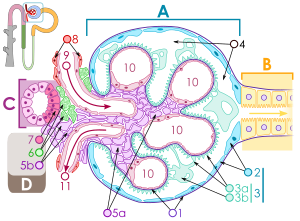Juxtaglomerular cell


The juxtaglomerular cells (JG cells, or granular cells) are cells in the kidney that synthesize, store, and secrete the enzyme renin. They are specialized smooth muscle cells in the wall of the afferent arteriole (and sometimes the efferent arteriole) that delivers blood to the glomerulus. In synthesizing renin, they play a critical role in the renin-angiotensin system and thus in renal autoregulation, the self-governance of the kidney.
In appropriately stained slides by, juxtaglomerular cells are distinguished by their granulated cytoplasm.
Similar to cardiac tissue, juxtaglomerular cells harbor β1 adrenergic receptors. When stimulated by epinephrine or norepinephrine, these receptors induce the secretion of renin. These cells also respond directly to a decrease in systemic blood pressure which is manifested as a lower renal perfusion pressure.
See also
External links
- Histology image: 16010loa – Histology Learning System at Boston University
- Template:EMedicineDictionary
